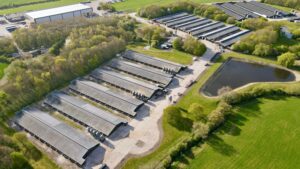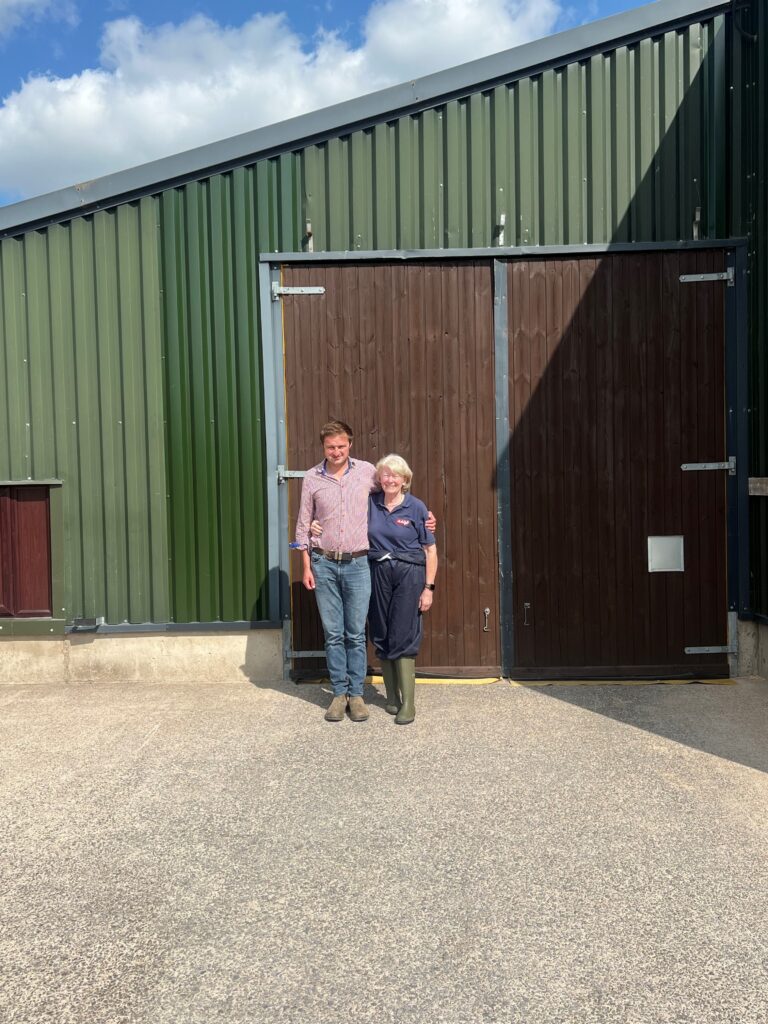EC Drummond’s Shirley Copeland has retired after a distinguished career in broiler production marked by a steadfast commitment to excellence. Michael Barker hears all about it from her and managing director Sam Drummond
Not many people would be beating themselves up over performance figures one day before their retirement.
Shirley Copeland, it’s fair to say, is cut from different cloth. Far from coasting towards the conclusion of a career spanning over three decades in poultry, the 66-year-old production manager at broiler producer EC Drummond is cursing the fact that she only had one shot at joining the rarefied company of the newly introduced Ross 470 Club. “We had the 400s, the 420s, 450s, and it just went up to 470 on 1 May,” she explains, speaking to Poultry Business the day before her retirement in early June. “I had hoped to get that 470 because that was my first and only chance to do it. It was a 464 so it was close, but it’s a pity.”
The situation sums up Copeland perfectly – a workhorse with a drive towards excellence that has served her and her employers extremely well since she joined the business back in xx. Copeland runs the Pershore site at EC Drummond, where her numbers have always stood up to scrutiny – the farm has just produced an FCR of 144, with average weight of 2.41 and EPEF of 464 at an age of 34.99 days.
The last time Poultry Business spoke to Copeland was two years ago, in a period when she enjoyed both an exhilarating career high shortly after suffering a devastating personal low. Her husband Albert passed away suddenly in June 2023, just before she was named Grower of the Year at the National Egg & Poultry Awards.

Reflecting on an extraordinary period of her life with the benefit of space, it’s clear what an emotional rollercoaster Copeland rode over that summer. She describes the award win as “the pinnacle of my career”, delighting in the fact that her three children were all present at the gala dinner in London to see her collect her trophy. By contrast, the loss of her husband was absolutely heartbreaking: Shirley and Albert had been together since she was just 13, and they were engaged at 16 and married at 18. “We were together all those years and we were quite a tight couple, and he was the biggest influence on me in terms of my career as well,” she says.
The Copelands’ story, recounted in these pages following Shirley’s award win, saw them play a significant role in the success of a business that has achieved much outside of the spotlight of publicity.
Family ties
Herefordshire-based EC Drummond’s poultry operation has come a long way in the years that Copeland worked in the business. When the Edinburgh native and her husband joined, the company had just four farms, but today that number has reached an impressive 40 across the country, producing a million birds at its peak, though that number is a little lower now since it reduced its stocking density to 30kg/m2 in line with market requirements. Raising broilers from day-old to up to 50 days depending on customer demand, it is by any metric a sizeable business, placing biosecurity and production efficiency at the heart of its ethos.
A true mixed enterprise with interests across arable, top-fruit and soft-fruit crops in addition to the broiler business, today the poultry side is run by 35-year-old family member Sam Drummond, who has been in the company since the tender age of just 22 back in 2012. He is joined by his brother Ben, who handles the arable and fruit operations, while their father Eric – who took over the family firm with his wife in 1979 and led EC Drummond through various stages of growth – still officially holds the position of chairman.

EC Drummond is a rarity in succeeding at the upper echelons of both horticulture and meat production, but Sam Drummond insists that approach has actually served as an advantage over the years. “Dad’s always drummed into us that if you have a mixed, diverse business, then when one is down, another is up and so you weather the storm,” he explains.
It might not have been Sam’s plan to take over the poultry side – when he came home after his studies, older brother Ben had already taken on the soft-fruit enterprise – but he threw himself into it and immediately saw the opportunity to expand, adding farms to the portfolio rather than building new ones as others quit the industry or scaled back. “It’s been a tricky couple of years financially trying to balance everything,” Drummond admits, “but it’s looking better going forward with prices getting somewhere where they need to be.”
Drummond says he learnt a lot from Copeland about the way things should be done, adding that she “runs a tight ship” with her farm always known for being clean, tidy and on point with its performance. “It’s fair to say she always goes above and beyond,” he adds when asked about how she interacts with her colleagues. “And her results are always in the top 10% on average. She can turn bad chicks into good ones.”
Backing up Drummond’s observation, Copeland freely admits she has “always run quite a strict regime”, and even wonders whether her style would still work in the more sensitive world of younger-generation employees. “My dedication has always been to work, and I think times are changing and it’s not quite the same now,” she reflects. “My main piece of advice to younger people is the more you put into it, the more you get out of it. If you’re happy to just be in the middle of the road, fine, but I was maybe a bit too over-dedicated. I expect a lot and I like everyone to do their job properly. I was a hard taskmaster and maybe that’s not the right way to be nowadays.”
Copeland insists it was never a problem having such a young boss when Drummond came into the business and even laughs that she “has told him off a few times”. “We had worked for Eric for a long time when Sam came and took over here, and that could have been tricky because he was so much younger, but it wasn’t at all,” she recalls. “We just carried on and worked alongside Sam the way we had done with Eric. The transition was fine and there was no problem.”
She speaks warmly of the Drummond family, and in particular Eric, who was extremely supportive following Albert’s death. Unsurprisingly, he arranged a lovely gift and a bottle of champagne for her departure, and she is keen to stress that the relationship with the family has always been based on the utmost mutual respect.
Part of the reason why Copeland speaks so fondly of the company is the Drummonds’ ethos of handing their farm managers their wings, with considerable autonomy to run their sites in the way they see fit. It’s part of a company philosophy to treat its approximately 80 staff well and encourage them to flourish in their roles. “We try to let people run the farms as their own and make as many decisions as possible without us breathing down their neck,” Drummond explains. “We want to give them flexibility and empowerment to do what they think is right. A lot of big companies integrate everything and you have to do exactly as they say, whereas we don’t try to prescribe too much. We don’t have too many people leave us, so hopefully that’s a good sign.” In an industry not known for having an abundance of applicants for any role, that’s an undeniably advantageous position to be in.
Copeland – who will clearly be a tough act to replace – very much echoes that message, saying it has been one of the biggest benefits of working at the firm. “It’s the closest you could get to having your own farm,” she adds. “They let you run it pretty much as your own place, as long as you communicate what your ideas are.”
One of the most pleasing things is that attitude still permeates despite the growth of the business, which has expanded tenfold in terms of the number of farms it had when Copeland joined. It’s a period in which the industry has undergone significant change in terms of both regulation and customer requirements too, but she insists that some philosophies are eternal. “The basics are the same as what they were 30 years ago – do the job right and don’t ever give up,” she states. “How often do you hear people saying ‘I’ve got some bad chicks in’ and then they just give up? Keep at it – it’s amazing how things can turn around. A couple of crops ago we had a very difficult start with problems with feed, and that crop came out well in the end. It would have been very easy to have just given up, but we didn’t.”
Moving with the times
Copeland might be an advocate for good old-fashioned elbow grease, but that’s not to say she hasn’t moved with the times. She points out that EC Drummond was one of the first in the industry to adopt computerisation 30 years ago, recounting an anecdote of how she went on a training course in the 90s and had to haul an entire desktop computer down to Hertfordshire with her.
Copeland said she “never in a million years” envisaged having the career she did, and while it’s doubtful she grew up dreaming of a lifetime in poultry, one senses the satisfaction at the way things worked out and she insists she has no regrets whatsoever. She and Albert had been planning to buy a camper van and tour the British Isles at the time he fell ill, and while that plan was understandably shelved following his passing, she says she may find the itch to travel strikes again, once she’s had chance to enjoy some well-earned time with her family.
For the poultry business she leaves behind, Drummond says the plan going forwards is to invest in the farms and future proof them for the next 20 years, as well as continue to become more efficient and climb up the performance leaderboards.
For Copeland, the quieter retired life awaits, but with a mind as sharp as hers and a commitment to giving her all, one suspects she won’t be sitting still for long.


